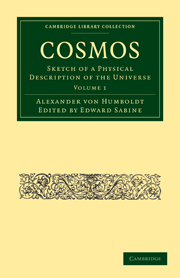Book contents
- Frontmatter
- Contents
- Title in the series
- INCITEMENTS TO THE STUDY OF NATURE: General Remarks
- HISTORY OF THE PHYSICAL CONTEMPLATION OF THE UNIVERSE
- Division into historic periods, or epochs of progress, in the generalisation of physical views
- PRINCIPAL EPOCHS IN THE HISTORY OF THE PHYSICAL CONTEMPLATION OF THE UNIVERSE
- EPOCHS IN THE HISTORY OF THE CONTEMPLATION OF THE UNIVERSE. CONQUESTS OF ALEXANDER
- EPOCHS IN THE HISTORY OF THE CONTEMPLATION OF THE UNIVERSE. EPOCH OF THE PTOLEMIES
- EPOCHS IN THE HISTORY OF THE CONTEMPLATION OF THE UNIVERSE. ROMAN EMPIRE
- EPOCHS IN THE HISTORY OF THE CONTEMPLATION OF THE UNIVERSE.—ITS ADVANCEMENT BY THE ARABIANS
- EPOCHS IN THE HISTORY OF THE CONTEMPLATION OF THE UNIVERSE.—OCEANIC DISCOVERIES
- EPOCHS IN THE HISTORY OF THE CONTEMPLATION OF THE UNIVERSE.—DISCOVERIES IN THE CELESTIAL SPACES
- RETROSPECT OF THE PRINCIPAL EPOCHS IN THE CONTEMPLATION OF THE UNIVERSE
- NOTES
- INDEX
EPOCHS IN THE HISTORY OF THE CONTEMPLATION OF THE UNIVERSE.—OCEANIC DISCOVERIES
from HISTORY OF THE PHYSICAL CONTEMPLATION OF THE UNIVERSE
Published online by Cambridge University Press: 05 August 2011
- Frontmatter
- Contents
- Title in the series
- INCITEMENTS TO THE STUDY OF NATURE: General Remarks
- HISTORY OF THE PHYSICAL CONTEMPLATION OF THE UNIVERSE
- Division into historic periods, or epochs of progress, in the generalisation of physical views
- PRINCIPAL EPOCHS IN THE HISTORY OF THE PHYSICAL CONTEMPLATION OF THE UNIVERSE
- EPOCHS IN THE HISTORY OF THE CONTEMPLATION OF THE UNIVERSE. CONQUESTS OF ALEXANDER
- EPOCHS IN THE HISTORY OF THE CONTEMPLATION OF THE UNIVERSE. EPOCH OF THE PTOLEMIES
- EPOCHS IN THE HISTORY OF THE CONTEMPLATION OF THE UNIVERSE. ROMAN EMPIRE
- EPOCHS IN THE HISTORY OF THE CONTEMPLATION OF THE UNIVERSE.—ITS ADVANCEMENT BY THE ARABIANS
- EPOCHS IN THE HISTORY OF THE CONTEMPLATION OF THE UNIVERSE.—OCEANIC DISCOVERIES
- EPOCHS IN THE HISTORY OF THE CONTEMPLATION OF THE UNIVERSE.—DISCOVERIES IN THE CELESTIAL SPACES
- RETROSPECT OF THE PRINCIPAL EPOCHS IN THE CONTEMPLATION OF THE UNIVERSE
- NOTES
- INDEX
Summary
The fifteenth century belongs to those rare epochs in the history of the world, in which all the efforts of the human mind are invested with a determinate and common character, and manifest an unswerving direction towards a single object. The unity of these endeavours, the success with which they were crowned, and the vigour and activity displayed by entire nations, give grandeur and enduring splendour to the age of Columbus, of Sebastian Cabot, and of Vasco de Gama. Intervening between two different stages of cultivation, the fifteenth century forms a transition epoch belonging at once to the middle ages and to the commencement of modern times. It is the epoch of the greatest discoveries in geographical space, comprising almost all degrees of latitude, and almost every gradation of elevation of the earth's surface. To the inhabitants of Europe it doubled the works of Creation, while at the same time it offered to the intellect new and powerful incitements to the improvement of the natural sciences in their physical and mathematical departments.
The world of objects, now as in Alexander's campaigns but with yet more preponderating power, presented to the combining mind the separate forms of sensible objects, and the concurrent action of animating powers or forces.
- Type
- Chapter
- Information
- CosmosSketch of a Physical Description of the Universe, pp. 230 - 300Publisher: Cambridge University PressPrint publication year: 2010First published in: 1846



